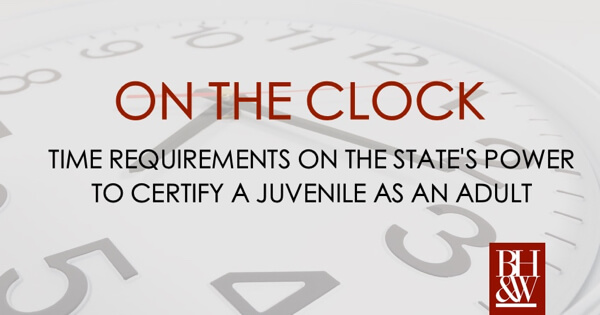
Time Requirements on the State’s Power to Certify a Juvenile as an Adult
 Texas Family Code Section 54.02 gives the juvenile court the power to transfer its exclusive jurisdiction over a juvenile case to a district court. This transfer of jurisdiction allows the State to treat a juvenile as an adult for purposes of prosecution. Section 54.02 actually lays out two different processes for transferring juvenile cases to adult court. The first process is used in cases where the juvenile is under the age of 18 at the time of certification. The second, which is laid out in Section 54.02(j), is for those cases in which a person has turned 18 prior to the filing of the case in juvenile court. The Texas Court of Criminal Appeals recently upheld the time requirements placed on the power of the State to pursue post-18 certifications in Moore v. State(Case Opinion – 2017).
Texas Family Code Section 54.02 gives the juvenile court the power to transfer its exclusive jurisdiction over a juvenile case to a district court. This transfer of jurisdiction allows the State to treat a juvenile as an adult for purposes of prosecution. Section 54.02 actually lays out two different processes for transferring juvenile cases to adult court. The first process is used in cases where the juvenile is under the age of 18 at the time of certification. The second, which is laid out in Section 54.02(j), is for those cases in which a person has turned 18 prior to the filing of the case in juvenile court. The Texas Court of Criminal Appeals recently upheld the time requirements placed on the power of the State to pursue post-18 certifications in Moore v. State(Case Opinion – 2017).
Section 54.02(j)’s Time Limits
Section 54.02(j) allows a juvenile court to transfer its jurisdiction to an appropriate district court for criminal proceedings if the person accused is 18 years of age or older at the time the petition is filed but was a juvenile at the time the offense was committed. During the transfer hearing, the State must prove by a preponderance of the evidence that “for a reason beyond the control of the State, it was not practicable to proceed in juvenile court before the 18th birthday of the person or after due diligence of the State, it was not practicable to proceed in juvenile court before the 18th birthday of the person because the State did not have probable cause to proceed in juvenile court and new evidence has been found since the 18th birthday of the person or the person could not be found.”
This section of the Family Code imposes on the prosecutors a duty to pursue cases in juvenile court whenever possible. In order to retain the power to prosecute cases after a person has aged out of the juvenile system, the State must show that the delay in prosecution was beyond its control. If it is unable to prove this, then the only choice available for a juvenile court in these situations is to dismiss the case.
The Issue in Moore v. State
In Moore, the accused was charged with Aggravated Sexual Assault of a Child. He was alleged to have committed the offense when he was 16 years of age. Due to a heavy caseload and an error in one of the police reports, the detective did not send the case to the District Attorney’s Office until after Moore had turned 18. The prosecutor filed a certification petition in the case over a year later when Moore was 19 years old. The juvenile court transferred the case to district court.
Moore pled in adult court and received 5 years’ probation on a deferred adjudication. He then appealed the case claiming that the juvenile court lacked the jurisdiction to transfer the case because the State did not prove that the delay in filing the case was beyond its control. The State first claimed that law enforcement should not be considered “the State” under Section 54.02(j). The State then argued that the court should consider whether the reasons for the delay were unconstitutional. According to this argument, if the reasons for the delay were not in violation of Moore’s constitutional rights, then the State should be allowed to proceed with the certification regardless of who was to blame for the postponement in filing charges.
The Court’s Ruling
After considering the arguments of both sides, the ruling of the Court of Appeals, and the case law presented by the parties, the Court of Criminal Appeals ruled on the case. First, the Court held that the term “the State” includes law enforcement and prosecutors collectively. The Court pointed out that the law consistently includes law enforcement in its use of this term.
The Court then dismissed the State’s notion that the requirements of Section 54.02(j) be treated like a claim of speedy trial, due process, or statute of limitations. The Court explained that the reason for the requirements in Section 54.02(j) is to limit the power of the State to prosecute a person as an adult for something that happened when he was a juvenile. In order for an exception to be made to this general rule, the State must prove that it was not at fault for the delay in prosecution.
Conclusion
The Court of Criminal Appeals’ decision in Moore is consistent with the Texas Supreme Court’s rulings in other cases involving juvenile certifications. The courts are clear that juvenile cases should be handled in juvenile court when possible. This means that detectives and prosecutors working juvenile cases must be diligent in giving these cases the proper priority so that an accused juvenile does not age out of the system before his case can be heard by the juvenile court. In any case in which prosecution is delayed until after a person’s 18th birthday, the State will be required to prove that the reason for this lag time was beyond its control. And if the State is unable to meet this requirement, then the courts will prevent further prosecution in these cases.

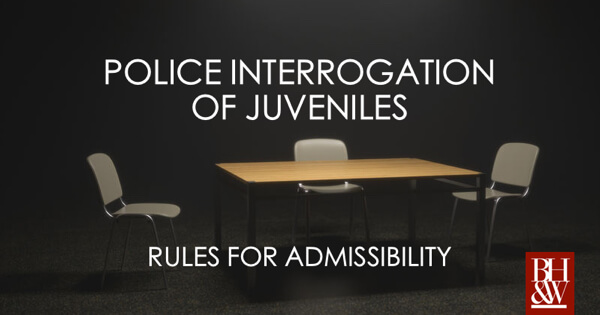
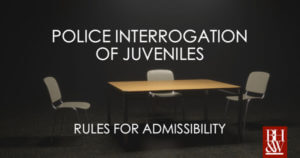 The juvenile justice system in Texas is a hybrid system which incorporates major elements of the adult criminal system, while maintaining separate rules and procedures to ensure that juveniles are not treated or labeled as criminals. In keeping with this philosophy, there are some special rules that apply when police officers take statements from juvenile suspects. This article will explain these rules and when they apply.
The juvenile justice system in Texas is a hybrid system which incorporates major elements of the adult criminal system, while maintaining separate rules and procedures to ensure that juveniles are not treated or labeled as criminals. In keeping with this philosophy, there are some special rules that apply when police officers take statements from juvenile suspects. This article will explain these rules and when they apply.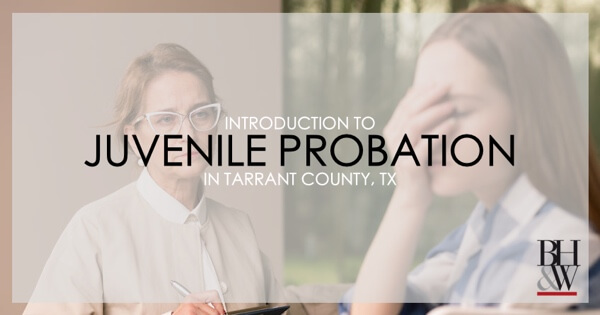
 Many people have the perception that the juvenile system is simply a slap on the wrist for kids, regardless of the offense. The reason for this belief is the fact that most kids in the juvenile system get probation. But, probation is not always that simple or easy. This is an introduction to juvenile probation in Tarrant County. This article will cover the reasons behind the tendency towards probation, the length and parameters of probation and what it can include.
Many people have the perception that the juvenile system is simply a slap on the wrist for kids, regardless of the offense. The reason for this belief is the fact that most kids in the juvenile system get probation. But, probation is not always that simple or easy. This is an introduction to juvenile probation in Tarrant County. This article will cover the reasons behind the tendency towards probation, the length and parameters of probation and what it can include.
 As parents, we want the best for our children. We also want to protect our kids as much as we can. So, naturally, the first reaction for most parents when they find out that their child is being charged with a crime in the juvenile system is to do whatever they can to make the whole thing go away. However, in many cases, this is the worst thing you can do for your child. A lot of times, having a child placed on juvenile probation can be a blessing in disguise, especially if you understand the keys to success in the juvenile system.
As parents, we want the best for our children. We also want to protect our kids as much as we can. So, naturally, the first reaction for most parents when they find out that their child is being charged with a crime in the juvenile system is to do whatever they can to make the whole thing go away. However, in many cases, this is the worst thing you can do for your child. A lot of times, having a child placed on juvenile probation can be a blessing in disguise, especially if you understand the keys to success in the juvenile system.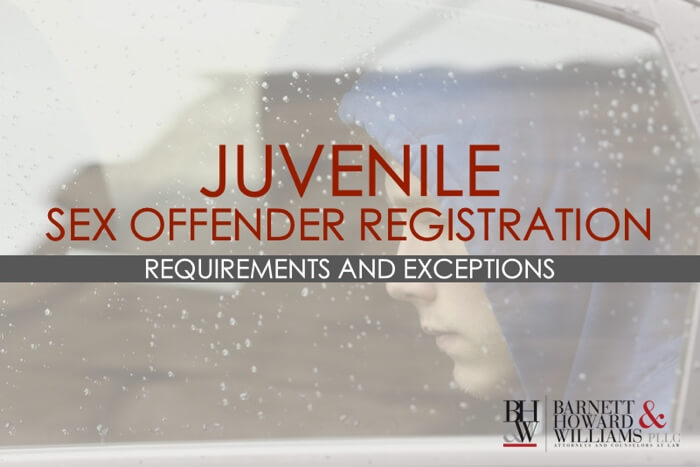
 In Texas, the law governing sex offender registration contains several provisions that apply specifically to juveniles. This means that sex offender registration works differently in juvenile cases than it does in adult cases. This article will highlight how sex offender registration works in the Texas juvenile justice system and why this is an appropriate approach to take in these cases. This article will not discuss exemptions to the sex offender registration law for certain young adult offenders.
In Texas, the law governing sex offender registration contains several provisions that apply specifically to juveniles. This means that sex offender registration works differently in juvenile cases than it does in adult cases. This article will highlight how sex offender registration works in the Texas juvenile justice system and why this is an appropriate approach to take in these cases. This article will not discuss exemptions to the sex offender registration law for certain young adult offenders.
 “Sexting” has become a very popular activity amongst teenagers and young adults in the last several years. This generation sees it as just another ordinary part of life with cell phones. For parents, prosecutors, and law enforcement officers, however, sexting is a dangerous habit that has wide-ranging effects. While sexting has the potential to severely damage lives and reputations, the very nature of it makes it difficult for authorities to adequately address the problems it causes. This article will explore what sexting is, how common it is, the applicable laws, and the practical implications of applying those laws to common instances of sexting.
“Sexting” has become a very popular activity amongst teenagers and young adults in the last several years. This generation sees it as just another ordinary part of life with cell phones. For parents, prosecutors, and law enforcement officers, however, sexting is a dangerous habit that has wide-ranging effects. While sexting has the potential to severely damage lives and reputations, the very nature of it makes it difficult for authorities to adequately address the problems it causes. This article will explore what sexting is, how common it is, the applicable laws, and the practical implications of applying those laws to common instances of sexting.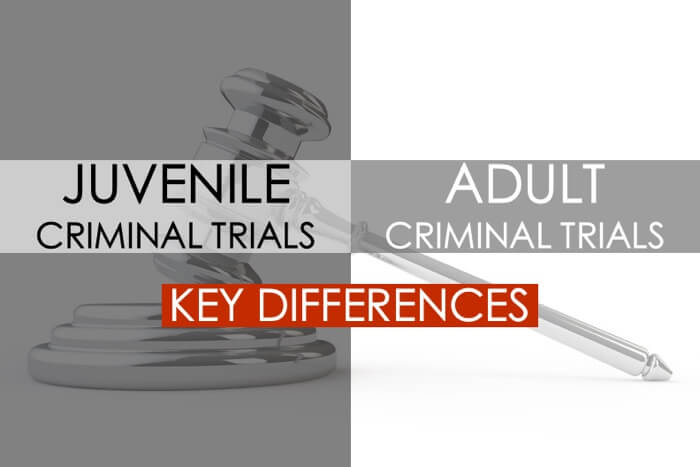
 The juvenile justice system is a hybrid system. Juvenile proceedings are technically civil in nature, but they incorporate many elements from the criminal system. The reason for this separate system is to teach children that they will be held responsible for their actions without labeling them as criminals. The differences between adult and juvenile trials is a direct result of this difference in systems.
The juvenile justice system is a hybrid system. Juvenile proceedings are technically civil in nature, but they incorporate many elements from the criminal system. The reason for this separate system is to teach children that they will be held responsible for their actions without labeling them as criminals. The differences between adult and juvenile trials is a direct result of this difference in systems.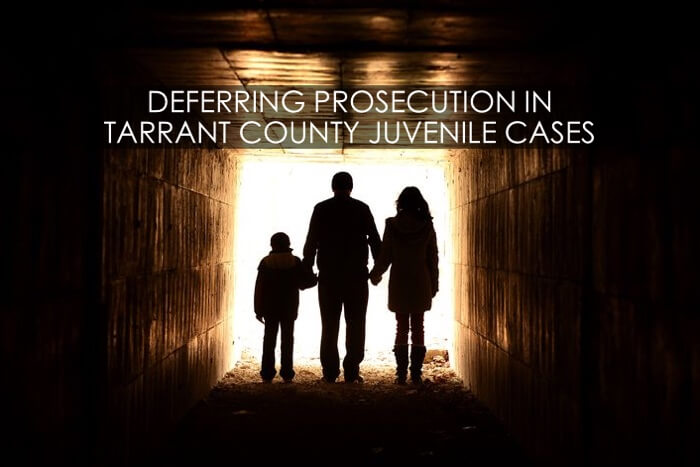
 Are there any options for my child short of going to court? Many parents ask this question after finding out that their child has been referred to the juvenile system. For a lot of kids who are in trouble for the first time, there is a great option available: Deferred Prosecution Program (DPP). In Tarrant County, DPP is used quite often. This article will answer all of your questions about DPP.
Are there any options for my child short of going to court? Many parents ask this question after finding out that their child has been referred to the juvenile system. For a lot of kids who are in trouble for the first time, there is a great option available: Deferred Prosecution Program (DPP). In Tarrant County, DPP is used quite often. This article will answer all of your questions about DPP.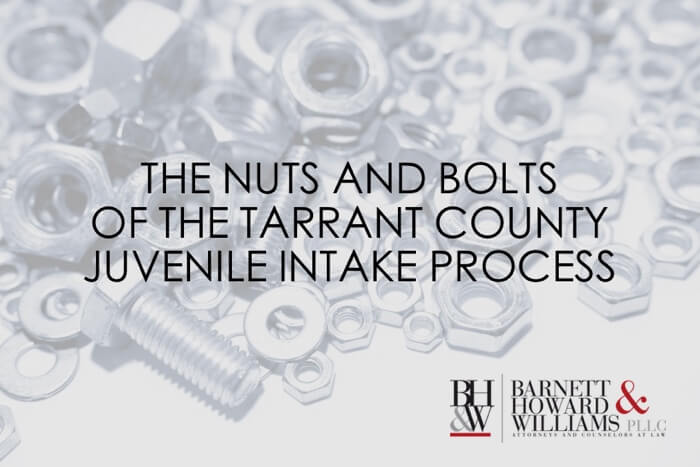
 In Tarrant County, the Juvenile Probation Department is the intake agency for the county. This means that when a police officer files a case against a juvenile, it goes to Juvenile Probation before being sent to the District Attorney’s Office. The common practice is for cases to be referred by law enforcement officers without making an arrest. When this happens, there is a specific process in place with certain tasks that the juvenile intake officers must perform before a case is referred to the prosecutor. This article will walk you through this often-misunderstood process and explain why those juvenile probation officers do what they do.
In Tarrant County, the Juvenile Probation Department is the intake agency for the county. This means that when a police officer files a case against a juvenile, it goes to Juvenile Probation before being sent to the District Attorney’s Office. The common practice is for cases to be referred by law enforcement officers without making an arrest. When this happens, there is a specific process in place with certain tasks that the juvenile intake officers must perform before a case is referred to the prosecutor. This article will walk you through this often-misunderstood process and explain why those juvenile probation officers do what they do.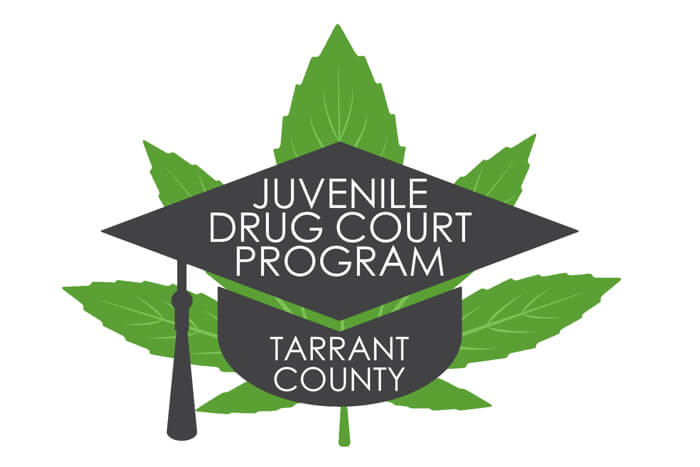
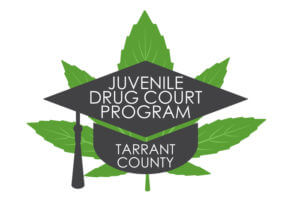 Last week I wrote about things that
Last week I wrote about things that 





